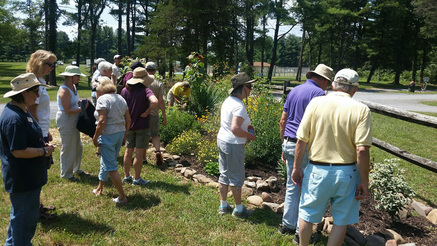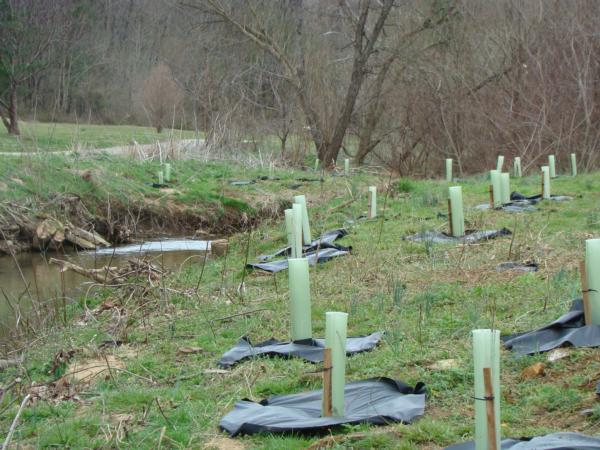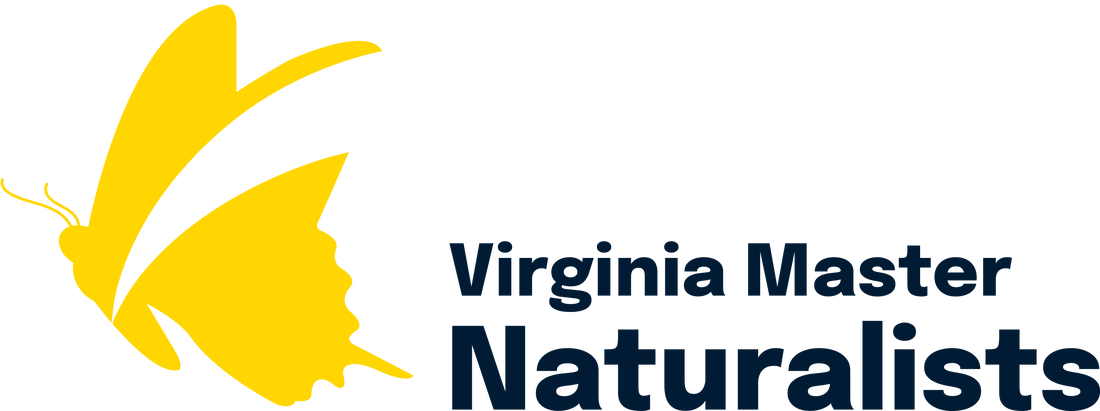 Headwaters Chapter volunteers visit one of the pollinator gardens created through their chapter focus project.
Headwaters Chapter volunteers visit one of the pollinator gardens created through their chapter focus project. For several years, a few of our VMN chapters have done chapter “focus projects” - projects that the chapter works on as a team, engaging volunteers from across different training cohorts, and that are intended to have more significant impacts on natural resource conservation than can be accomplished by volunteers working individually. For example, in 2015, the Headwaters Chapter installed a series of five pollinator waystations spread across Rockingham and Augusta counties. The project included researching where and what to plant and developing interpretive signage for each of the sites, as well as the actual planting. More than 20 VMN-Headwaters Chapter volunteers were involved.
In our VMN 2015-2020 strategic plan, supporting chapters through mini-grants to help them conduct projects is one of the listed priorities. Thanks to a generous grant from an anonymous donor, plus matching funds from the many VMN volunteers who donated to our annual campaign, we are able to meet this goal in 2016. We put out a call to chapters for mini-grant proposals specifically to support chapter focus projects. Our intention is to support not only positive outcomes for natural resources, but also positive outcomes for chapters, such as increased volunteer retention and engagement, and development of new partnerships.
We have funded focus projects for nine different chapters:
The funds have just been dispersed and most projects are just getting started, but one is already well underway. Volunteers in the Roanoke Valley Chapter worked together to improve a stream much in need of protection. The stream had turf nearly up to the edge of the water and evidence of erosion, but now has a newly-planted riparian buffer with native trees and shrubs. The mini-grant helped the chapter purchase all the plants as well as the necessary tree tubes and other materials to ensure that they thrive. To expand the impacts of their work, they also engaged local high school students in the project. Their next step will be developing interpretive signage to help park visitors know what the plantings are all about and why they are important for stream conservation.
In our VMN 2015-2020 strategic plan, supporting chapters through mini-grants to help them conduct projects is one of the listed priorities. Thanks to a generous grant from an anonymous donor, plus matching funds from the many VMN volunteers who donated to our annual campaign, we are able to meet this goal in 2016. We put out a call to chapters for mini-grant proposals specifically to support chapter focus projects. Our intention is to support not only positive outcomes for natural resources, but also positive outcomes for chapters, such as increased volunteer retention and engagement, and development of new partnerships.
We have funded focus projects for nine different chapters:
- Central Blue Ridge Chapter – Developing and installing an interpretive trail for a new Nelson County park
- Fairfax Chapter – Establishing long-term monitoring of three DGIF Birding and Wildlife Trail loops
- Historic Southside Chapter – Developing a native pollinator garden in Isle of Wight County
- Holston Rivers Chapter – Conducting a BioBlitz at Hungry Mother State Park
- James River Chapter – Conducting a wildlife survey at Belmead
- Northern Neck Chapter – Increasing diversity through enhanced outreach programming
- Peninsula Chapter – Conducting a biological inventory of Lucas Creek
- Riverine Chapter – Developing educational materials for parks in the VDGIF Henrico Birding and Wildlife Trail Loop
- Roanoke Valley Chapter – Installing a riparian buffer in a Roanoke County park
The funds have just been dispersed and most projects are just getting started, but one is already well underway. Volunteers in the Roanoke Valley Chapter worked together to improve a stream much in need of protection. The stream had turf nearly up to the edge of the water and evidence of erosion, but now has a newly-planted riparian buffer with native trees and shrubs. The mini-grant helped the chapter purchase all the plants as well as the necessary tree tubes and other materials to ensure that they thrive. To expand the impacts of their work, they also engaged local high school students in the project. Their next step will be developing interpretive signage to help park visitors know what the plantings are all about and why they are important for stream conservation.



 RSS Feed
RSS Feed